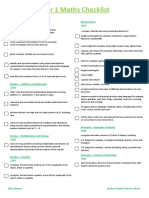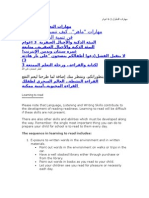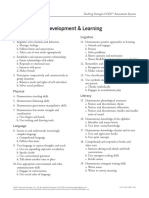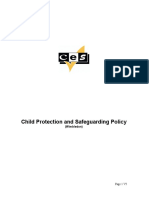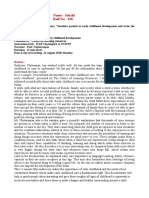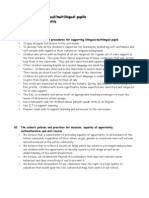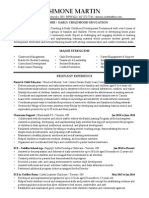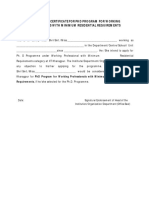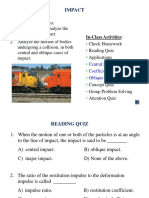Foundational Literacy and Numeracy: A Pre-requisite to Learning and
ECCE
Background Note
Prof. Suniti Sanwal, Head DEE, NCERT
Introduction
Early childhood (birth to 8 years) is a critical period of development and early literacy and early
numeracy are two important skill areas that develop during this period. Literacy and numeracy
development begins in the first three years of life and is closely linked with daily communications,
actions, thoughts and drawings of young children. Parents and the home learning environment and
interactions of young children with literacy materials as books, paper, and crayons are the building
blocks for the development of language, reading, writing and numeracy. This understanding of
early literacy development complements the current research supporting the critical role of early
experiences in shaping brain development.
Education in the Early Years
Young children are active, energetic, curious and interested in people, objects and events around
them. They actively seek to make meaning of their experiences and their capacities continuously
evolve. Children learn by doing and actively use their sensory capacities to understand the world
around them. They discover and construct knowledge through the activities they are involved in.
To enable children to understand concepts and develop their abilities, adults need to provide them
opportunities to explore their environment, manipulate objects, engage in experimentation and ask
questions and search for answers. These hands-on experiences help them understand how things
work and in this way each child re-constructs his/her own understanding of the world.
At the same time, children learn in context of relationships. Children also need guidance and
instruction from teachers and more knowledgeable peers who can help the child to move from one
developmental level to the next – they help the children to move through their zone of proximal
development. Having identified concepts and tasks which are within the child’s potential
development level (i.e. what the child is capable of doing with help), the teacher needs to provide
dynamic support, guidance and teaching so that the child reaches her potential and is able to do the
task independently.
�Definition of Literacy and Numeracy
UNESCO defines literacy as the ‘ability to identify, understand, interpret, create, communicate,
compute and use printed materials associated with varying contexts. (Education for All; Global
Monitoring Report, UNESCO, 2006). Literacy is more than the ability to read and write. It
involves the knowledge, skills and abilities— the competencies—that enable individuals to think
critically, communicate effectively, deal with change and solve problems in a variety of contexts to
achieve their personal goals, develop their knowledge and potential, and participate fully in
society.
Numeracy encompasses the ability to use mathematical understanding and skills to solve problems
and meet the demands of day-to-day living in complex social settings. To have this ability, a young
person needs to be able to think and communicate quantitatively, to make sense of data, to have a
spatial awareness, to understand patterns and sequences, and to recognise situations where
mathematical reasoning can be applied to solve problems.
Why are Literacy and Numeracy Important?
Early literacy and numeracy skills are not only foundational for learning but are correlated with
greater quality of life, personal well-being, national stability, prosperity and are critical for
educational outcomes in later years. Strong literacy and numeracy helps children to learn,
experiment, reason and create, to be active and informed citizens, and to contribute socially,
culturally and economically. Lack of learning opportunities during the early stages of acquiring
literacy and numeracy impede children’s academic progress and motivation, resulting in further
lack of achievement.
Vision
The vision for foundational literacy and numeracy therefore is to enable children to become
independent and engaged readers and writers who are able to transition from ‘learning to read‘ to
‘reading to learn’ and from ‘learning to write ‘ to ‘writing for academic success and pleasure’.
Children demonstrate an understanding of numbers and knowledge of mathematical concepts,
make connections between related ideas and progressively apply their understanding in new and
unfamiliar contexts.
�To achieve the vision it is important that we understand the present status of reading and writing
among children in the country. Various researches conducted in the country point out that the
children are facing a learning crisis.
The Learning Crisis
The National Policy on education (NEP,2020) highlights that various governmental as well as
non-governmental surveys clearly indicate that, at the current time, we are in a severe learning
crisis with respect to these most basic skills: a large proportion of students (over 5 crore in
number) currently in elementary school - have not attained foundational literacy and numeracy,
i.e., the ability to read and comprehend basic text and the ability to carry out basic addition and
subtraction with Indian numerals. Numerous studies show that, in the current educational system,
once students fall behind on foundational literacy and numeracy, they tend to maintain flat learning
curves for years, perpetually unable to catch up. So many capable students have found themselves
in this unfortunate black hole, unable to emerge. For many students, this has become a major
reason for not attending school, or for dropping out altogether.
The NEP, 2020 further reiterates that it is imperative to address this crisis head on and immediately
so that basic learning can be accomplished in schools and all students may thereby gain the
opportunity to obtain an education of quality. Attaining foundational literacy and numeracy for all
children must become an immediate national mission. Students, along with their schools, teachers,
parents, and communities, must be urgently supported and encouraged in every way possible to
help carry out this all-important target and mission, which indeed forms the basis of all future
learning.
The NEP, 2020 has recommended that In order to avert the learning crisis there will be an
increased focus on foundational literacy and numeracy -and generally, on reading, writing,
speaking, counting, arithmetic, and mathematical thinking -throughout the preparatory and middle
school curriculum, with a robust system of continuous formative/adaptive assessment to track and
thereby individualize and ensure each student's learning. The aim of education will not only be
cognitive development, but also building character and creating holistic and well-rounded
individuals equipped with the key 21st century skills. For this assessment in our schooling system
will shift from one that is summative and primarily tests rote memorization skills to one that is
�more regular and formative. The system will be competency-based, promote learning and
development of children, and test higher-order skills, such as analysis, critical thinking, and
conceptual clarity.
Way Forward
The Ministry of Education, Government of India has already launched the National Initiative for
Proficiency in Reading with Understanding and Numeracy (NIPUN Bharat) mission along with a
detailed implementation guideline for the states to ensure that every child in the country
necessarily attains foundational literacy and numeracy (FLN) by the end of Grade 3, by 2026-27.
For this, the learning outcomes have been defined for six years in a continuum in six levels from
Preschool to grade 3 (3-9 years).It has also set the ‘Lakshya’ (targets) for each class from Balvatika
onwards. The mission guidelines recommend shifting towards competency based education and
using school based assessment for providing continuous guidance to teachers.
In tune with the National Mission, the State Mission, District Mission and Block missions have to
be chalked out by the states and ensure that the learning outcomes are achieved. Roles and
responsibilities and functions of all the stakeholders involved in the mission at each level are
defined in the NIPUN Guidelines.
A robust IT system is recommended to be used for FLN Mission for big data analytics at National,
State and School level. The FLN Mission recommends leveraging DIKSHA (Digital Infrastructure
for Knowledge Sharing) which is the national digital platform forschool education in India, an
initiative of National Council for Education Research and Training (NCERT) and Ministry of
Education. To empower the teachers, a capacity development programme for teachers and school
heads, NISHTHA, FLN will be launched by the NCERT through DIKSHA online platform. A 3
Month School Preparatory Module-VidyaPravesh has also been launched by the NCERT.
The FLN Guidelines also advocate engaging meaningfully with parents, families and community
to create awareness among them also to engage them in the teaching learning process of their
children.













